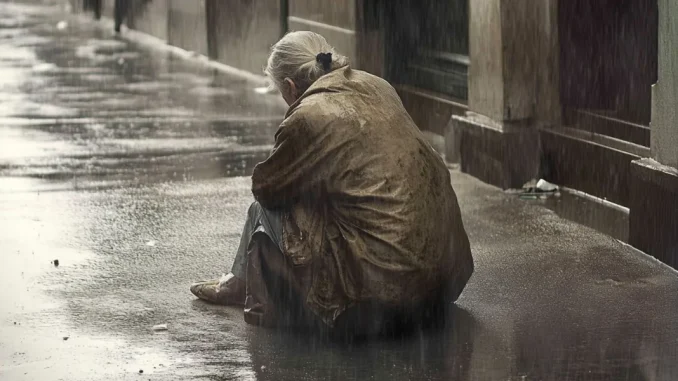
I never imagined I’d one day be sharing my home with a complete stranger—especially not someone I found sitting under a flickering streetlamp, soaked to the bone in the rain.
But that’s exactly what happened.
I’m Henry, thirty years old. Ever since my mother passed away last year, I’ve been living alone in the house I grew up in. My father left when I was little, so it had just been the two of us for as long as I could remember.
After she was gone, the house felt like a hollow shell—quiet, too spacious, and filled with an emptiness that echoed. I tried to keep busy with work, spending time with my girlfriend Sandra (though we hadn’t moved in together yet), and just… coasting through life. But deep down, I was craving something more. Something real.
Then, one rainy evening, I saw her.
She was sitting motionless on the sidewalk, hunched beneath a dying streetlight. Older—maybe late fifties or early sixties—but it wasn’t just her age that stood out. She wasn’t begging. She wasn’t looking for help. She just sat there, still, as if she belonged in the rain.
I should’ve walked past. But I couldn’t.
“Hey,” I called. “Why don’t you find somewhere dry?”
She turned toward me, her face lined with hardship, but her eyes… they were sharp, kind, intelligent. They reminded me of my mother. In that moment, I knew I couldn’t leave her there.
“I’m tired of bouncing between shelters,” she said softly. “It’s all pointless, son.”
Before I could even think it through, I offered, “You can stay in my garage.”
She hesitated, understandably. “Your garage?”
“It’s not as bad as it sounds,” I explained. “There’s a small room, a bed, a toilet, even water. My mom’s caregiver used to stay there sometimes. It’s messy, but I’ll clean it up.”
She looked at me, disbelief in her eyes, then let out a small laugh. “Well, I’ve got nothing to lose. I’m Dorothy.”
“Henry,” I said. “I’ve got some food with me. Let’s get you out of the rain.”
And just like that, I brought her home.
That night, I gave her blankets and food. Then I locked the main house and drove to Sandra’s. I needed to tell her what I’d done before she found out on her own.
“You let a homeless woman move into your garage?” she asked, wide-eyed. “What if she’s dangerous?”
“She’s not,” I assured her. “She just needed help.”
“You’re too trusting, Henry,” she said, sliding a plate of sandwiches toward me. “You could’ve just come to stay with me.”
“It’s not about being alone,” I said. “There was something about her. I just… I wanted to help.”
Sandra reluctantly agreed to meet Dorothy the next day.
Later, I brought more food to the garage. I knocked but got no answer. I figured she was resting. But the next morning, something felt… off.
I walked to the garage, peeked through the window—and froze.
The place had been transformed. Cleaned. Organized. Cozy. The clutter was gone. A couch was draped with a blanket, a makeshift table held a small plant, and my mother’s books and framed photos were carefully arranged.
And there was Dorothy. Sitting calmly, reading. Wearing one of my mom’s old dresses. She looked nothing like the woman I had picked up off the street. She looked like she belonged.
“Oh God,” I muttered, stepping inside. “What happened here?”
Dorothy smiled. “I just tidied up. It feels good to have a space of my own again.”
“Who are you?” I asked.
She paused, then said, “I used to be a professor. English literature. Before… everything.”
She shared her story in fragments. Once a respected academic with a life full of books, students, and intellectual debates, Dorothy had lost everything. First her parents in a car accident. Then her husband and teenage son in a senseless shooting. Grief swallowed her whole. She quit her job, stopped answering calls, stopped living.
“I let it all slip away,” she whispered. “When you’ve lost everything, losing yourself doesn’t even matter anymore.”
I didn’t know what to say, so I said the only thing I could: “I’ll make us some food.”
I brought her a proper meal. She was stunned. “This is too much,” she said.
“It’s not enough,” I replied.
Sandra met her that evening and was surprised. “She’s so… put together. And honestly? Her grammar’s better than ours.”
Over time, Dorothy became more than just a guest. I added little comforts to the garage—a mini-fridge, a stove, shelves for food. Eventually, she got a job at the library. Then a small apartment of her own.
When I visited her new place, it was neat and warm, her books lined up just like before. She handed me a cup of tea.
“You made it,” I said.
“We made it,” she smiled.
And I realized: one act of kindness can change everything. Dorothy didn’t just find shelter—she found herself again. And helping her helped me heal, too. Because in the end, kindness isn’t just something you give. It’s something that comes back to you.
Leave a Reply